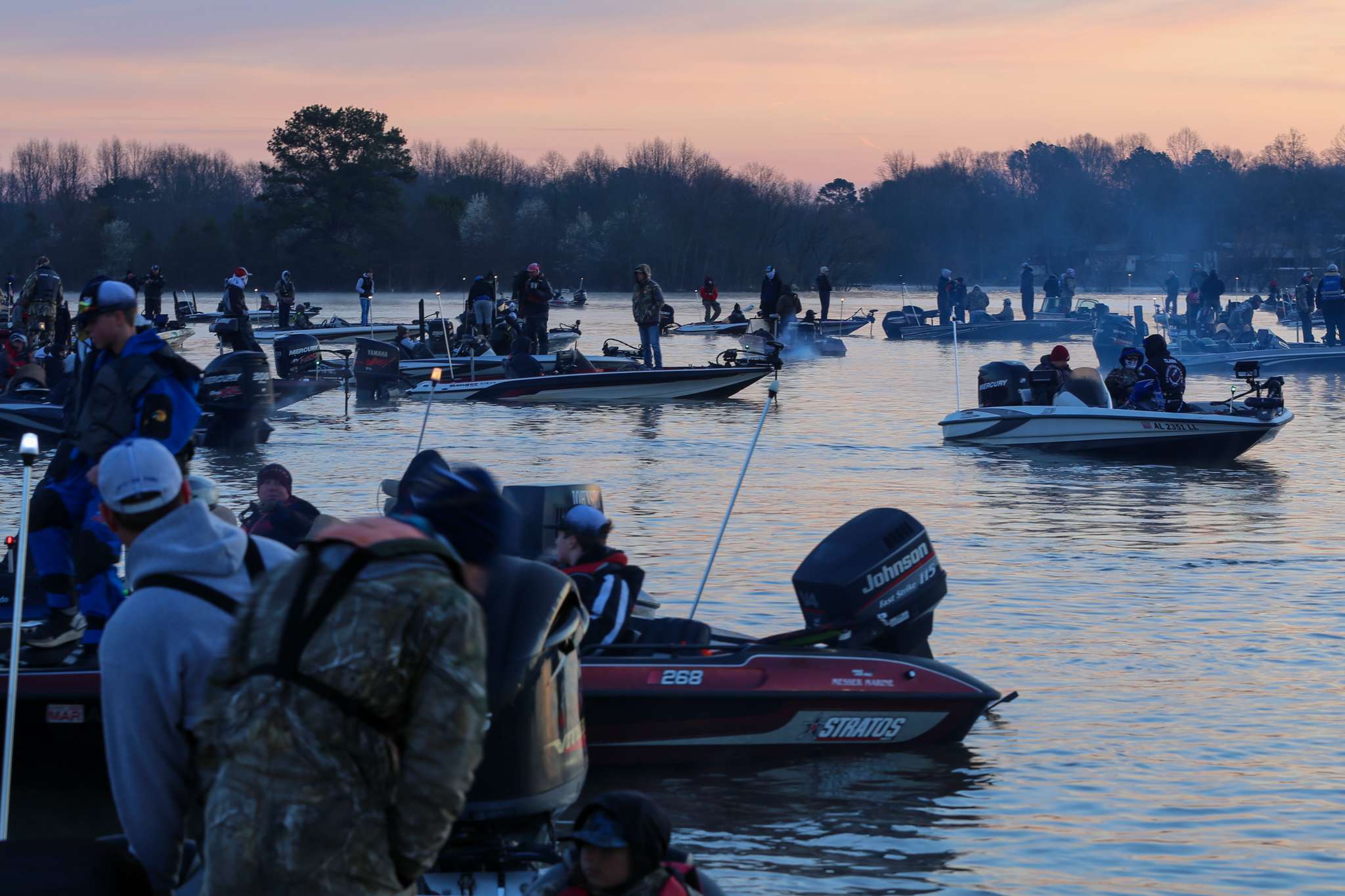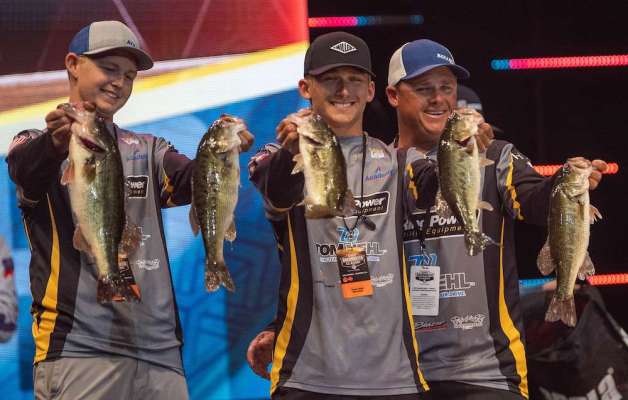
by Tommy Abbott
I have many opportunities to talk to a vast number of high school bass fishing captains and parents. Lately, the theme has often revolved around one subject: “Can, and will, my young angler make it at the next level?”
I’ve got a little experience with this myself, but I want to talk a little bit about something that most people probably aren’t considering or even thinking about. “Does my young angler want to make it at the next level?”
Just this week I’ve had inspiration from several conversations with parents of kids on all sides of this subject. The latest was with a dad/captain who’s son’s path was laid out in front of him. He had around five offers from colleges to come fish and have the support of the school to keep him fishing without the strains that others face without that support. Their decision was fairly simple, where does he want to go to college?
Taking nothing away from that process, which isn’t an easy one because they have tough decisions to make, but there are others out there who have even tougher decisions.
These decisions affect families and relationships if not handled in a delicate manner. Dreams can fade as the reality of life sets in. Parents always want the best for their kids. They want to see them grow up happy and successful. Many parents with kids who participate in sports have visions of grandeur for their kids.
For bass fishing families, those include trips up on the big stage holding up monster fish and cashing checks. Deals with sponsors and companies who partner with young anglers to help support their dreams.
The reality of all this is, like any sport, not all will make it to the next level. Even more of a reality can set in when a parent’s dream for their kid suddenly ends, not because the talent wasn’t there, but because for one reason or another, that young angler just didn’t want to pursue that lifestyle.
It takes a very bold and mature young person to realize that something about the sport that they love so much doesn’t fit into their plans or appeal to what they want for their lives. To say those words to a parent who they know has those hopes and dreams for their child isn’t easy.
Brandon Palaniuk wrote a great article on the realities of the sport of bass fishing. He gave a behind the scenes look into the often non-spoken things he felt that people needed to realize before they jump in to try to become a professional angler.
I want to cover some things that pertain to high school anglers and even some at the junior level.
College bass fishing, is it a reality?
I think I can safely say that most parents hope their kids will go to college. They feel it’s probably the easiest path to an easier life and prosperity. I, for one, also understand the value of apprenticeships and on the job training. Trade school is an often overlooked path for kids, but for this we are focusing on college and college bass fishing.
Is college right for your kid? That’s the first and foremost question you must ask yourself and your young angler as he or she gets nearer to the end of a high school career. Many young anglers just want to fish.
The sad reality for some is that they just don’t like school. They’d rather be out in nature enjoying the outdoors and many are daydreaming of that while they are in school. Those types of kids often don’t make the grades to attend college nor do they have any interest in continuing the process at the college level.
Please understand, and this is very important, your kid doesn’t want to say those words to you. They don’t want to tell you that they don’t want to go to college. Be supportive of their decisions. It’s not one you can make for them. As one dad told his son recently, “Son, I can’t live your life for you, only you can do that.” I was so proud and respected this dad’s acceptance of this fact and willingness to let his son make that choice.
So your kid doesn’t want to go to college, what now?
I’ll continue to focus on young anglers here and the decision not to go to college will make their fishing aspirations quite a bit tougher. Without the support of a college team, the burden of expense falls on either the angler, the parents or a combination of both.
Most 19 year olds are not that business savvy. Most don’t have a huge amount of sponsors. Their fishing resume is small. Accomplishments included a partner who they had rely on, hopefully helping them to succeed at the high school level.
So who’s going to pay the bills? That’s the first obstacle to overcome. Reality tells us that mom and dad will probably take a large brunt of expenses just like they did in high school. If the family is wealthy, it may not be so bad, but for the vast majority of young anglers, they don’t come from wealthy families.
Of course young anglers can go the co-angler route, and that’s really the best and cheapest plan, but understand that those anglers have to be on the water regularly if they want to continue to compete. They will have to hone their skills in places other than their home water and familiar situations at some point in their young careers. That’s going to cost money. Is that even an option for your child?
Is your young angler even ready for the next level?
One reality for so many young anglers who choose the non-college route is that they now they’ve been thrown in 100% with “dult” anglers. They no longer are competing with anglers at their age level and are forced into a trial by fire.
Whether it be college or fishing semi professionally, is your kid ready, or even more importantly, capable of competing at the next level? Do they have the skills that it takes to compete with top level competition?
Can they fish techniques outside their comfort zone? Are they even willing to fish outside their comfort zone? If they aren’t, then a serious evaluation of their abilities needs to take place.
Can they master electronics and seasonal patterns? Can they fish both deep lakes and shallow? Offshore or pounding a bank? Do they know how to catch largemouth, smallmouth and spots because it’s going to take all three to compete at the next level.
For you captains of juniors and young high schoolers, don’t make the mistake of deciding everything for your team. Take the potential fall on the leaderboard and make them learn from their decisions and mistakes. Spend time teaching them how to pattern fish and what is taking place at different times of the year. Where the bait and fish are, and what they feed on during all conditions and times of year. Have those discussions on the water, don’t just make a move or change a technique yourself without explaining what you are doing and why.
First and foremost, realize that they have to catch the fish, not you. Don’t get blindsided like I did by you going out and catching good fish in practice when your anglers actually caught very little. Chances are, they will catch very little on tournament day.
And the biggest thing of all … when they get in that boat without you, did you teach them enough or did they learn enough to catch fish and compete at the next level? Unfortunately, many will realize that without their captain or parent in the boat, and even more importantly pre-fishing for them, they aren’t really as good as they thought.
So what do they want to do with their life?
Sadly, many kids at 18 to 19 years old don’t have a clue what they want to do with their life. Mom and dad want to tell them what to do, but some just want to live life and have fun.
For young anglers that probably includes fishing quite a bit, but does it mean that they want to fish for a career? The good thing … they don’t have to decide right now. For those being sought by colleges, the decision has to be made a little earlier, but just because they don’t want to go to college doesn’t mean that their potential future as a professional angler is over. Or is it?
Parents, understand this, fishing at the professional level requires way more than going out fishing everyday. That’s the fun part that most young anglers love. It’s the off the water things that take a toll on a potential professional angler. Some of these things they will get a taste of at the high school level, but others will come when mom and dad aren’t with them. Some young anglers will think about those things as they unfold in their high school career and realize that they may not be ready or prepared for the rigors of ultra competitive fishing and life on the road.
The simple thing like traveling and living on the road will not appeal to every young angler. In fact, it will be a deciding factor for many. They just don’t want to live that lifestyle.
Others just don’t want to be broke all they time and the strain that brings. And let’s be honest, the vast majority of young anglers chasing the professional dream are extremely limited on funds. Those young people may decide that they want get a job and work so they will have money to do what they want and the freedom that they think that brings.
Some just don’t want to put in the work it takes to become or be a professional angler. They don’t want to work tackle and boat shows. They may not like being in the public eye nor having to promote products.
The list could go on and on, but the final thing and point that comes under this heading is this. Some may realize themselves that they just don’t have what it takes to compete at the next level. They realize that their success came with too much help from others and not enough for their own skills and contributions. They realize that they didn’t learn enough to make a living fishing. It doesn’t mean they don’t love fishing, it just means that they are mature enough to realize it and admit it.
The dream of a potential career in the fishing industry or as a professional fisherman doesn’t end there.
It just has to continue to grow with a passion for fishing and love for the outdoors. I believe that it’s never too late to chase a dream. The only thing holding a dream back is determination and work. With work on the water comes knowledge. With knowledge, passion and time the dream may come alive again.
Encourage them to get on the water as much as they can and keep that passion for fishing alive.
But for now, support the decisions of your young aspiring angler and help them live their dreams no matter what they may be.




